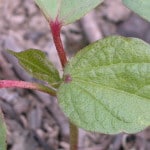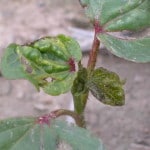That’s kind of a dramatic title, but it is true that thrips are always present on seedling cotton at some level. We’ve finally have some cotton getting out of the ground. It is almost a given that this cotton was treated with imidacloprid (e.g., Gaucho, Aeris, Acceleron FI). Thiamethoxam-based seed treatments such as Cruiser or Avicta are no longer recommended in cotton because tobacco thrips have developed resistance, and tobacco thrips are the primary target of insecticide seed treatments in cotton. Data across the Mid-South has clearly shown inadequate plant protection with thiamethoxam-based seed treatments such as Cruiser in cotton during the past 3-4 years.
Because imidacloprid is in the same class of chemistry as thiamethoxam, it’s certainly possible that we could be or are going down the same resistance path. This has made me a little more inclined to make a foliar application to seedling cotton for control of thrips. I would not call this an “automatic” application, but under conditions of poor emergence and slow seedling growth, I am encouraging an application sometime between the 1st and 2nd true leaf and especially if thrips injury is being observed on emerging leaves. It is better to error on the early side than to delay application to the 3rd-leaf stage. Research indicates that you would very rarely see an economic benefit from making two foliar insecticide applications for thrips.
Deciding to make this foliar application takes some professional judgement. We are typically talking about a time frame of 10-14 days after emergence. You will not need this application if the cotton shoots out of the ground and the first or emerging second true leaf looks great. If the leaves are ‘thripy’ and thrips are present, or worse yet there is not even a true leaf readily apparent by 10-14 days after emergence, then a foliar application is suggested. You can usually bet that if it takes 8-10 days to get complete emergence then your cotton will meet the criteria to make this foliar application.
Recommended foliar insecticides include Acephate/Orthene at 0.2-0.25 lb ai/acre, Bidrin at 2.0-3.2 oz/ace, Dimethoate at 6 oz/acre, and Radiant at 1.5 oz/acre. The use of an adjuvant with Radiant is strongly suggested.



